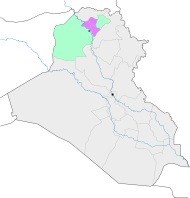Ephraim Avigdor Speiser
Ephraim Avigdor Speiser | |
|---|---|
| Born | January 24, 1902 |
| Died | June 15, 1965 (aged 63) |
| Nationality | American |
| Occupation | Harrison Research Fellow in Semitics at the University of Pennsylvania |
| Known for | discovery of the ancient site of Tepe Gawra |
| Academic background | |
| Alma mater | Dropsie College (Ph.D.) |
| Academic work | |
| Discipline | Assyriologist |
| Sub-discipline | Archaeology, Biblical commentator |
| Institutions | University of Pennsylvania |
| Notable students | Moshe Greenberg |
| Notable works | Genesis (AYB) |
Ephraim Avigdor Speiser (January 24, 1902 – June 15, 1965) was a Jewish Polish-born American Assyriologist. He discovered the ancient site of Tepe Gawra in 1927 and supervised its excavation between 1931 and 1938.
Pre-war career
He was born in Skalat, Galicia, (then in Austrian Poland, now Ukraine) and went to school in Lwow. In 1920, at the age of 18, he emigrated to the United States, eventually becoming a US citizen in 1926. He studied at the University of Pennsylvania, from which he received his M.A. in 1923, before earning his Ph.D. from Dropsie College in Philadelphia in 1924.[1] From 1924 to 1926 he was Harrison Research Fellow in Semitics at the University of Pennsylvania.[2]
In 1926, Speiser won a Guggenheim Fellowship to study remains of the ancient Mitanni and Hurrians in northern Mesopotamia. While there in 1927 he discovered the Tepe Gawra (or "Great Mound"), one of the world's earliest cradles of civilization. In 1928 he was appointed assistant professor of Semitics at the University of Pennsylvania, and full professor in 1931. He was field director of the Joint Excavation of the ASOR and the University Museum, 1930–1932, 1936–1937, undertaking excavations in Tepe Gawra and Tell Billa. He also translated the Hurrian legal texts found at Nuzi.
During World War II, Speiser left academia to become chief of the Office of Strategic Services' Near East Section of the Research and Analysis Branch in Washington. He established a long tradition of American students and scholars of Orientalistik entering and serving in the intelligence services.
Post-war
After the war he returned to the University of Pennsylvania, where he was Chairman of the Department of Oriental Studies from 1947 until his death in 1965. He was also appointed Ellis Professor of Hebrew and Semitic Languages and Literatures there in 1954.
He translated and wrote extensive commentary for the volume on Genesis in the Anchor Bible Series and was one of the editors of the Torah in the New Jewish Publication Society of America Version of the Old Testament.
A noted student of his, (future professor) Moshe Greenberg, became an Israel Prize laureate in Bible studies.
Selected works
- Mesopotamian Origins: the Basic Population of the Near East. Philadelphia: University of Pennsylvania Press. 1930.
- New Kirkuk Documents relating to Family Laws. New Haven. 1930.
{{cite book}}: CS1 maint: location missing publisher (link) - Excavations at Tepe Gawra. Vol. 1. Philadelphia: University of Pennsylvania Press. 1935.
- with Robert H Pfeiffer (1936). One Hundred New Selected Nuzi Texts.
- Studies in the History of Science. Philadelphia: University of Pennsylvania Press. 1941.
- Introduction to Hurrian. New Haven: Dows Nies. 1941.
- The United States and the Near East. Cambridge (MA): Harvard University Press. 1947.
- James B. Pritchard, ed. (1950). "Akkadian Myths and Epics". Ancient Near Eastern Texts Relating to the Old Testament. Princeton University Press.
{{cite encyclopedia}}: Cite has empty unknown parameter:|month=(help) - Genesis: Introduction, Translation and Notes (The Anchor Bible). New York: Doubleday. 1964.
- At the Dawn of Civilization. Rutgers University Press. 1964.
- Finkelstein, J. J.; Moshe Greenberg (1967). Oriental and Biblical Studies: Collected Writings of E. A. Speiser. University of Pennsylvania Press.
References
- ^ University of Pennsylvania Archives and Records Center
- ^ Speiser, Ephraim Avigdor, UCLA Cuneiform Digital Library Initiative
- 1902 births
- 1965 deaths
- Guggenheim Fellows
- Judaic studies in academia
- American archaeologists
- American Assyriologists
- Polish Assyriologists
- Jewish orientalists
- Translators of the Bible into English
- Jewish biblical scholars
- Jews from Galicia (Eastern Europe)
- Austro-Hungarian Jews
- Ukrainian Jews
- American people of Ukrainian-Jewish descent
- Jewish translators of the Bible
- 20th-century translators
- Translators of the Bible into English who were not native speakers
- American academic scientist stubs
- American archaeologist stubs

